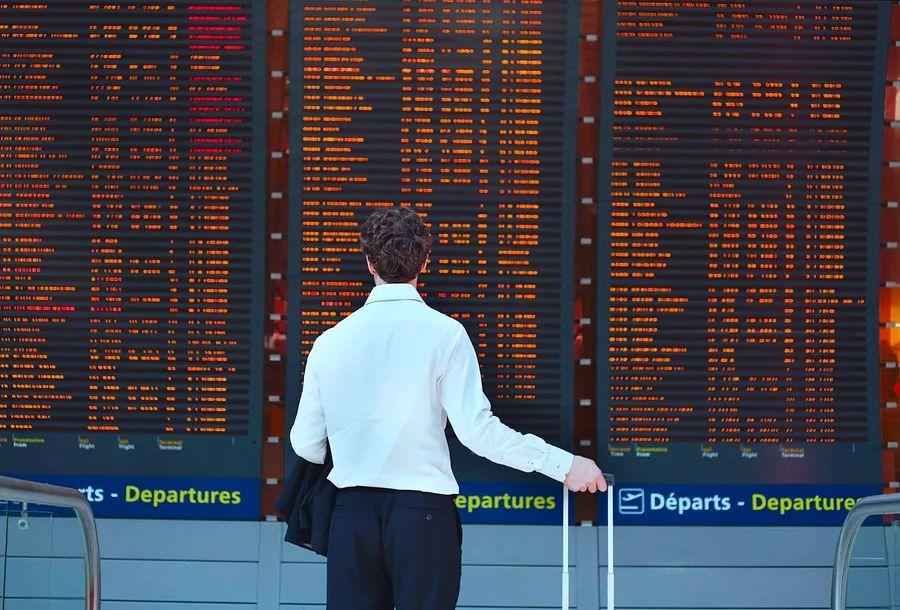What Causes Flight Delays?

We've all experienced it: arriving early at the airport with just carry-on luggage, breezing through security thanks to your TSA PreCheck, and finally settling down with a coffee—only to discover a delay on the flight information board. You may ask yourself: Why is my flight delayed? The truth is, it's often out of your hands. Even if you follow all the protocols, flight delays can be a common occurrence in travel.
Flight Delay Causes: What You Should Know

Fortunately, the landscape of flight delays and cancellations in the US has become clearer, thanks to monthly reports from the Department of Transportation (DOT) that detail on-time performance. Unlike their European counterparts, US airlines are not automatically obligated to compensate passengers for delays or cancellations (unless you opt not to travel after a cancellation). In fact, each US airline has its own policies regarding what assistance they offer in the event of a delay. However, this doesn’t mean you’re left without options. Airlines outline their responsibilities in their contracts of carriage, and the DOT ensures compliance.
Additionally, American carriers must report the reasons for their delays to the Bureau of Transportation Statistics. While you may have no control over the airlines, being aware of the reasons behind flight delays can help you navigate them better and potentially reduce the likelihood of experiencing delays yourself.
Continue reading to discover the 5 most frequent reasons for flight delays.
1. Weather Conditions
Fog, heavy rain, and strong winds: any severe weather phenomenon can result in delays. Temperature extremes can also impact flights. For instance, airlines may need to de-ice aircraft, which can take up to 30 minutes during a snowstorm. Moreover, even if your local weather is perfect, conditions in the departure city can lead to delays that ripple down to your flight.

Before that delayed flight can take off again, passengers must deboard; baggage has to be unloaded, and the aircraft requires cleaning, stocking, and refueling. All these steps can trigger a chain reaction of delays.
2. Delays Caused by Airlines
When you check the Bureau of Transportation Statistics' pie chart for on-time arrivals, you’ll notice a segment labeled 'air carrier delays,' which typically represents a significant portion of delays. This category encompasses issues within the airline's control, such as lengthy aircraft cleaning, slow baggage loading or unloading, crew challenges (like needing to replace unfit or absent crew members), and even fueling delays.
It also covers unexpected situations that fall under their control, such as mechanical issues, handling unruly passengers, servicing potable water, and dealing with damage from hazardous materials.
3. Air Traffic Congestion

Similar to highways, air traffic congestion can delay flights—and this congestion can often stem from issues on the ground. For example, if a flight leaves the gate late, it may affect the next flight scheduled for that gate, causing a domino effect of delays. Unfortunately, once airborne, an aircraft can’t simply accelerate to make up for lost time. Additionally, air traffic in the sky can lead to delays, as air traffic controllers may hold flights in a holding pattern before they can safely land.
If you’re using Dinogo’s Flight Tracker and notice that your plane departed on schedule with no adverse weather conditions in sight, it’s possible your flight is simply caught in a traffic jam.
A telltale sign: If your flight is marked as arrived but isn’t at the gate, it might be circling overhead.
4. Go-Around
You may recognize this as a missed approach or aborted landing. A touch-and-go landing, where the aircraft lands but takes off again, also qualifies as a go-around. This can occur due to various reasons, including strong winds across the runway, landing too quickly (without sufficient runway), fog, low visibility, and other factors.
Delays occur due to the time needed for landing or nearly landing before taking off again, circling, and beginning another descent.
5. Waiting for connecting passengers

Airlines typically won’t hold a flight for just one or two late passengers, even if they’re delayed from a connecting flight. However, operations centers may decide to delay a flight if a significant number of connecting passengers would be difficult to rebook otherwise. Occasionally, a flight might be held up if the luggage is taking longer than anticipated to transfer between planes.
What to do when a flight is delayed
Whether you're coping with an unavoidable delay or getting rebooked on another flight, here are some strategies to manage late flights.
Visit the lounge/gym/sleep pod

I've faced some truly perplexing flight delays: too long to linger in the terminal, yet not enough time to venture into the city for exploration. If you're stuck waiting for your flight, you might as well do it comfortably. I carry two credit cards that grant me access to various lounges.
For those who travel frequently, the premium food, drinks, showers, and even office spaces can make it worthwhile to invest in a privileged card. Additionally, you can purchase memberships to specific lounges, regardless of the airline you're using that day. Airports are increasingly offering non-lounge amenities as well, such as yoga rooms, gyms, and sleep pods, which provide day or hourly access.
Request compensation
While federal law doesn’t mandate airlines to provide compensation for delays, and the DOT doesn't define what qualifies as a 'significant delay,' you can still make a request. Airlines set their own policies and have their own definitions of delays. In the past, you had to research your airline’s contract of carriage, but now the DOT offers an aviation consumer dashboard that consolidates the commitments of the ten major airlines in one location.
No airline has committed to cash compensation for delays of three hours or more, but they may provide perks at their discretion. For instance, Alaska Airlines offers frequent flyer miles for delays of three hours or more, and along with Hawaiian Airlines, they may provide credit or travel vouchers for such delays.
Get rebooked
Being an informed traveler can be beneficial during delays. Half of the major US airlines commit to rebooking passengers on a partner airline or another affiliated airline at no extra charge in cases of significant delays.
You can get ahead on rebooking by looking up alternate flights on Dinogo.

Request vouchers
Not every airline guarantees a meal voucher for a three-hour wait due to a cancellation, but most do provide hotel accommodations. Additionally, nearly all will cover your transportation to and from a hotel if you need to stay overnight due to a significant delay.
While airlines have some flexibility, a travel voucher might not be explicitly promised in their contract; however, they may still offer one upon request. If you do get a travel voucher, be sure to inquire about any restrictions, such as blackout dates or expiration periods.
Tips to prevent flight delays
While you can't influence the airlines' punctuality, there are steps you can take to minimize delays.
Choose the earliest flight

Since air carrier delays and waiting for connecting passengers can lead to subsequent delays, it makes sense that these issues can compound throughout the day. Most airlines operating later flights have already completed earlier journeys that may have experienced delays. By booking the earliest flight, you stand a better chance of steering clear of such delays.
Select airlines known for their punctuality
OAG, a global travel data provider, monitors the on-time performance of airlines monthly and releases an annual report known as the Punctuality League. This report ranks the largest airlines worldwide based on their punctuality. OAG defines punctuality as arriving or departing within 15 minutes of the scheduled times. If avoiding delays is essential for you, choosing an airline with a proven track record for on-time performance may enhance your chances of a timely journey.
Opt for nonstop flights
The more connections in your itinerary, the greater the likelihood that one will face delays. If layovers are unavoidable, booking all legs with the same airline increases the chances they'll assist you with rebooking if necessary.
Dinogo Trips keeps all your reservations organized and provides real-time updates on cancellations, delays, and gate changes. You can also check flight delay information using the Federal Aviation Administration’s (FAA) color-coded map, helping you anticipate delays while you travel.
Have a credit card that offers coverage
Consider looking into credit cards that offer trip cancellation and interruption coverage, which can reimburse you for the non-refundable parts of your journey. Alternatively, you might purchase a travel insurance policy to cover expenses that airlines typically don’t, like rental cars.
If your luggage experiences a significant delay, many travel insurance policies also cover baggage loss and delay.
Aim to carry on your luggage
In my family, the golden rule was: Never check a bag. I still abide by this guideline, even for trips lasting more than a week. As flight delays accumulate, the efficiency of airline baggage handling can suffer.
If your itinerary includes multiple flights, you reduce the risk of arriving without your luggage. Additionally, if your trip faces significant delays and the airline agrees to rebook you, your options may be restricted if you’ve checked a bag for the entire journey.

How this guide was developed
I’m a veteran travel writer who spent years crafting a consumer advice column for Travel + Leisure magazine and wrote the “Takeoffs and Landings” column for The Wall Street Journal. Some of my most memorable travel moments have occurred during delays and cancellations, though I understand that being stranded isn’t everyone’s idea of a good time.
Some of our top flight routes
- Flights to San Francisco
- Flights to Boston
- Flights to Atlanta
- Flights to Florida
- Flights to Denver

1

2

3

4

5
Evaluation :
5/5